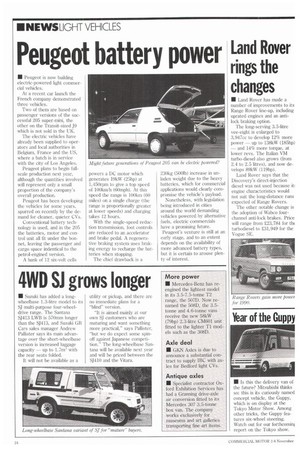Peugeot battery power rLianngds the
Page 24

If you've noticed an error in this article please click here to report it so we can fix it.
• Peugeot is now building electric-powered light commercial vehicles.
At a recent car launch the French company demonstrated three vehicles.
Two of them are based on passenger versions of the successful 205 super-mini, the other on the Transit-sized J9 which is not sold in the UK.
The electric vehicles have already been supplied to operators and local authorities in Belgium, France and the US, where a batch is in service with the city of Los Angeles.
Peugeot plans to begin fullscale production next year, although the quantities involved will represent only a small proportion of the company's overall production.
Peugeot has been developing the vehicles for some years, spurred on recently by the demand for cleaner, quieter CVs.
Conventional battery technology is used, and in the 205 the batteries, motor and control unit all fit under the bonnet, leaving the passenger and cargo space indentical to the petrol-engined version.
A hank of 12 six-volt cells
powers a DC motor which generates 19kW (25hp) at 1,450rpm to give a top speed of 100km/h (60mph). At this speed the range is 100km (60 miles) on a single charge (the range is proportionally greater at lower speeds) and charging takes 12 hours.
With the single-speed reduction transmission, foot controls are reduced to an accelerator and brake pedal. A regenerative braking system uses braking energy to recharge the batteries when stopping.
The chief drawback is a 230kg (5001b) increase in unladen weight due to the heavy batteries, which for commercial applications would clearly compromise the vehicle's payload. Nonetheless, with legislation being introduced in cities around the world demanding vehicles powered by alternative fuels, electric commercials have a promising future. Peugeot's venture is still at an early stage, and to an extent depends on the availability of more advanced battery types, but it is certain to arouse plenty of interest.


























































































































































